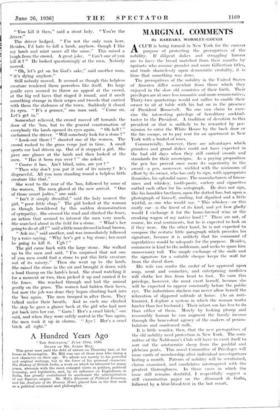MARGINAL COMMENTS
By BARBARA WORSLEY-GOUGH
ACLUB is being formed in New York for the curious purpose of protecting the prerogatives of the nobility. If diligent dukes and struggling barons are to have the bread snatched from their mouths by upstarts who assume grander and more Gilbertian titles, and trade shamelessly upon democratic credulity, it is time that something was clone.
The prerogatives of the nobility in the United States of America differ somewhat from those which they enjoyed in the slow old countries of their birth. Their privileges are at once less romantic and more remunerative. Thirty-two quarterings would not suffice to enable their owner to sit at table with his hat on in the presence of President. Roosevelt. No one can claim to exer- cise the interesting privilege of hereditary cocktail- taster to the President. A tradition of devotion to this president or that is unlikely to be rewarded by per- mission to enter the White house by the back door or the fire escape, or to pay rent for an apartment in New York with a bushel of roses.
Commercially, however, there are advantages which grandees and grand dukes could not have expected in the bad old days when they still carried swords and standards for their sovereigns. As a paying proposition the pen has proved once more its superiority to the sword—a pen, moreover, wielded with the minimum of effort by its owner, who has only to sign, with appropriate flourishes, his splendid name. The manufacturers of limou- sines and whiskey, tooth-paste, cutlery and cigarettes outbid each other for his autograph. He does not sign, like his humbler brethren, upon the dotted line, but upon a photograph of himself, smiling, but dignified and a little wistful, as one who would say. " This whiskey—or this costly car—is the finest of its kind, and yet how gladly would I exchange it for the home-brewed wine or the creaking wagon of my native land 1" These are not, of course, his real sentiments, but he is expected to look as if they were. On the other hand, he is not expected to -compose the ecstatic little paragraph which precedes his signature, because it is unlikely that his command of superlatives would be adequate for the purpose. Besides, commerce is kind to the nobleman, and seeks to spare him unnecessary toil. The simple exchange of the smile and the signature for a suitable cheque keeps the wolf far from the ducal door.
His wife can confer the cachet of her approval upon soap, scent and cosmetics, and enterprising modistes will clothe her free from head to foot. To earn this privilege, however, she must exert herself, because she will be expected to appear constantly before the public eye. The industrious duchess can never allow herself the relaxation of slippered solitude at home. (As an anti- feminist, I deplore a system in which the woman works harder than her husband.) Their infant son has less to do than either of them. Merely by looking plump and reasonably human he can augment the family income through the benevolent agency of the makers of peram- bulators and condensed milk.
It is little wonder, then, that the new prerogatives of the old nobility need protection in New York. The com- mittee of the Noblemen's Club will have to exert itself to sort out the aristocratic sheep from the pushful and plebeian goats. This novel Committee of Privileges will issue cards of membership after individual investigations lasting a month. Patents of nobility will he scrutinised, claims examined, and candidates interrogated with the greatest thoroughness. In those cases in which the issue still remains doubtful, I respectfully suggest a -stiff examination paper on the Abnanach de Gotha, followed by a blue-blood-test in the last resort.










































 Previous page
Previous page